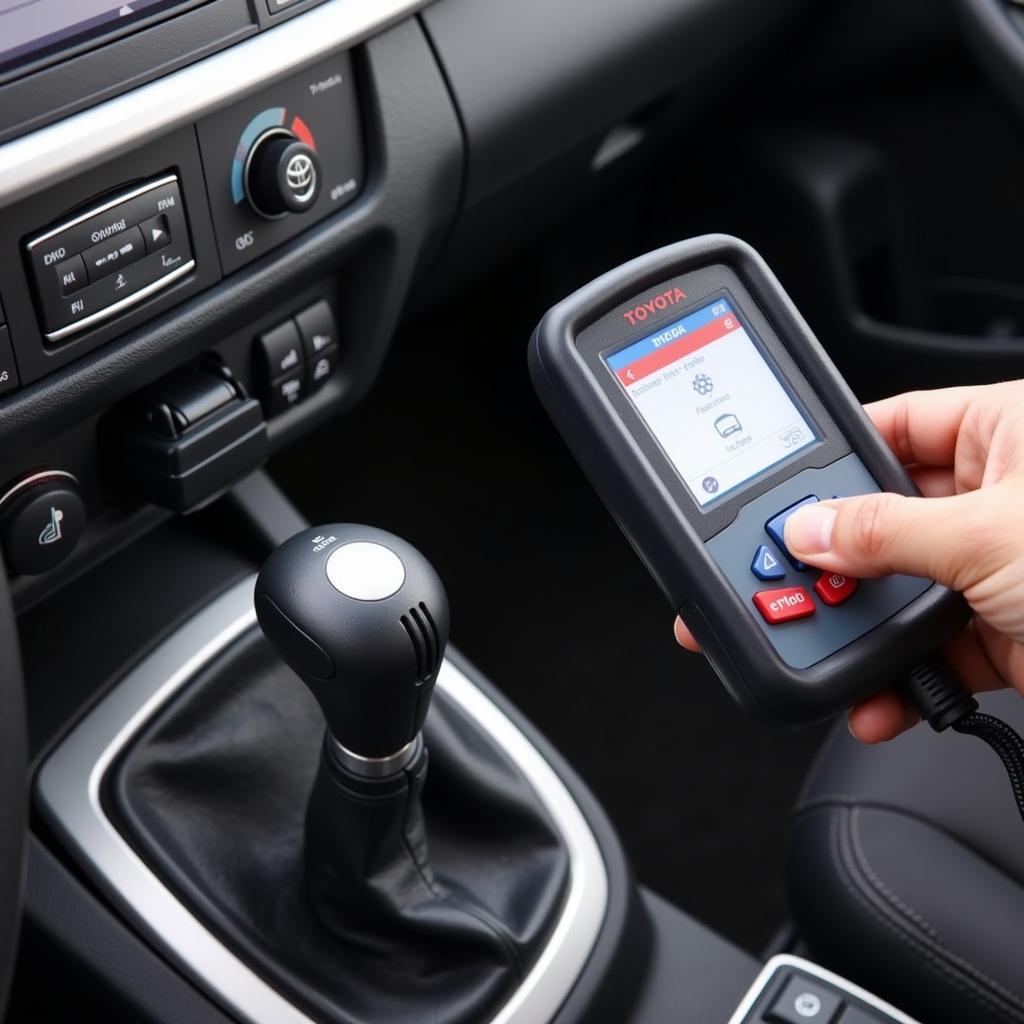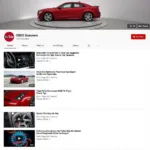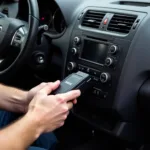When it comes to car maintenance and troubleshooting, having the right tools can make all the difference. For Toyota owners, a reliable Toyota OBD2 scanner tool is an essential asset. Whether you’re dealing with a check engine light or want to monitor your vehicle’s performance, an OBD2 scanner empowers you with valuable insights.
This guide dives deep into the world of Toyota OBD2 scanners, helping you understand their functionalities, explore different types, and choose the perfect one for your needs.
Understanding OBD2 Scanners and Their Importance for Your Toyota
OBD2, short for On-Board Diagnostics, is a standardized system in vehicles manufactured after 1996. This system acts like your car’s internal communication network, constantly monitoring various systems and components. An OBD2 scanner tool acts as the bridge between you and this system.
By connecting to the OBD2 port (usually located under the dashboard), the scanner retrieves diagnostic trouble codes (DTCs), which are essentially error codes indicating potential issues. But it doesn’t stop there. Modern OBD2 scanners go beyond simply reading codes.
They offer a wealth of information, including:
- Live data stream: Monitor real-time parameters like engine RPM, coolant temperature, oxygen sensor readings, and more. This is invaluable for diagnosing intermittent problems and understanding your engine’s behavior.
- Freeze frame data: Captures a snapshot of the engine’s parameters at the moment a fault code was triggered, providing valuable context for diagnosis.
- Readiness monitors: Checks the status of your vehicle’s emissions-related systems, crucial for passing emissions tests.
- Component testing: Allows you to interact with specific components, such as actuators and solenoids, to test their functionality.
Types of Toyota OBD2 Scanners
The market offers a wide range of OBD2 scanners, each with varying features and price points. Let’s explore the most common types:
1. Basic Code Readers
These entry-level scanners are budget-friendly and primarily focus on reading and clearing DTCs. They’re suitable for DIY enthusiasts who want to understand the reason behind a check engine light and potentially address simple issues themselves.
2. Advanced Code Readers
Offering more features than basic code readers, these scanners provide access to live data streams, freeze frame data, and even some bi-directional control capabilities. They are a good option for those who are more mechanically inclined and want more in-depth diagnostic information.
3. Professional-Grade Scanners
As the name suggests, these are high-end scanners used by professional mechanics and workshops. They offer the most comprehensive diagnostic capabilities, including advanced coding and programming functions, module access, and extensive troubleshooting databases. While they come at a higher price, their advanced features justify the investment for professional use.
4. Smartphone/Tablet-Based Scanners
These innovative scanners connect wirelessly to your smartphone or tablet, leveraging the device’s processing power and display. They often offer user-friendly interfaces, cloud storage for data logging, and the convenience of having your diagnostic tool on your mobile device.
Choosing the Right Toyota OBD2 Scanner Tool: Factors to Consider
Selecting the right OBD2 scanner for your Toyota involves evaluating your needs and budget. Here are key factors to consider:
-
Your Skill Level and Intended Use: Are you a casual user looking for basic diagnostics or a more advanced DIYer seeking in-depth information? Your skill level will guide you toward the appropriate scanner type.
-
Vehicle Compatibility: Ensure the scanner you choose explicitly states its compatibility with Toyota vehicles, particularly your specific model year.
-
Features: Determine the essential features you need, whether it’s reading and clearing codes, accessing live data, or performing component testing.
-
Budget: Set a realistic budget, keeping in mind that more advanced features generally come with a higher price tag.
-
Brand Reputation and Reviews: Opt for reputable brands known for producing reliable and accurate scanners. Reading user reviews can provide valuable insights into real-world performance.
Common Toyota Issues an OBD2 Scanner Can Help Diagnose
An OBD2 scanner can be your best friend when troubleshooting a range of common Toyota problems, such as:
- Check Engine Light: Identifying the cause behind a check engine light, which can range from minor issues like a loose gas cap to more serious engine problems.
- Oxygen Sensor Problems: Detecting malfunctioning oxygen sensors, which can negatively impact fuel economy and emissions.
- Catalytic Converter Issues: Diagnosing problems with the catalytic converter, a critical component for emissions control.
- Misfires: Pinpointing engine misfires, which can cause rough idling, reduced power, and increased emissions.
- Transmission Problems: Identifying issues with the transmission, such as slipping gears or rough shifting.
Beyond Diagnostics: How a Toyota OBD2 Scanner Enhances Your Ownership Experience
Investing in a Toyota OBD2 scanner does more than just help you diagnose problems. It empowers you with knowledge and control over your vehicle, enhancing your overall ownership experience:
- Preventative Maintenance: Regularly monitoring your vehicle’s vital signs allows you to address potential issues before they escalate, saving you time and costly repairs down the road.
- Performance Monitoring: Track your engine’s performance in real-time, allowing you to optimize your driving habits for better fuel efficiency.
- Increased Resale Value: A well-maintained vehicle with documented diagnostic records can command a higher resale value, demonstrating to potential buyers that the car has been properly cared for.
Conclusion
A Toyota OBD2 scanner tool is no longer just a tool for mechanics – it’s an essential asset for any Toyota owner who wants to stay informed about their vehicle’s health, troubleshoot issues effectively, and take a proactive approach to maintenance.
By understanding the different types of scanners available and considering your individual needs, you can make an informed decision and invest in a tool that will serve you well for years to come. Remember, knowledge is power when it comes to car ownership, and an OBD2 scanner is your key to unlocking that power.
FAQs about Toyota OBD2 Scanner Tools
1. Will any OBD2 scanner work with my Toyota?
While most OBD2 scanners are universally compatible with vehicles manufactured after 1996, it’s crucial to double-check compatibility with your specific Toyota model year to ensure seamless functionality.
2. Can I clear my own check engine light with an OBD2 scanner?
Yes, most OBD2 scanners allow you to clear DTCs and turn off the check engine light. However, it’s important to remember that clearing codes doesn’t fix the underlying problem. If the issue persists, the check engine light will reappear.
3. What is the difference between generic and enhanced OBD2 scanners?
Generic OBD2 scanners can read and clear basic engine-related codes. In contrast, enhanced scanners, often model-specific, can access more advanced functions, live data streams, and manufacturer-specific codes.
4. Do I need a professional mechanic to use an OBD2 scanner?
No, many OBD2 scanners are designed to be user-friendly, even for those with limited technical knowledge. However, if you’re uncomfortable interpreting codes or performing repairs yourself, consulting a qualified mechanic is always recommended.
5. Can an OBD2 scanner tell me when my next service is due?
While an OBD2 scanner primarily focuses on diagnostics, some advanced scanners or those paired with smartphone apps might offer service reminder functionalities.
6. Are wireless OBD2 scanners better than wired ones?
Wireless scanners offer convenience and portability, allowing you to use your smartphone or tablet as a display. However, wired scanners often provide a more stable connection and faster data transfer rates. The choice depends on your preference and intended use.
7. What should I do if my OBD2 scanner isn’t working?
First, ensure it’s properly connected to the OBD2 port and your vehicle’s ignition is turned to the “on” position. If the problem persists, check the scanner’s user manual for troubleshooting tips or contact the manufacturer’s customer support for assistance.
Explore More:
Have other questions or need personalized advice? Don’t hesitate to reach out! We’re here to assist you with all your Toyota OBD2 needs.
Contact us via WhatsApp: +1(641)206-8880 or Email: [email protected]. Our dedicated support team is available 24/7.


